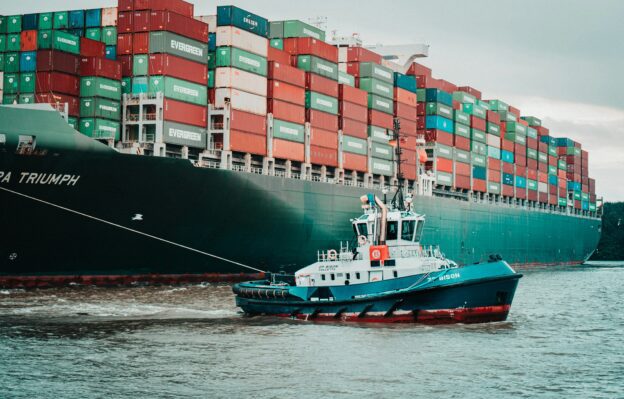GK Adviser Felix Griffin looks at the forces disrupting global supply chains and explores how industries and governments are adapting to this ‘new normal.’
Beyond shortages and delays: the existential challenges facing global supply chains
The intricate network of global supply chains currently faces a confluence of unprecedented challenges. The initial shockwaves of the COVID-19 pandemic exposed vulnerabilities in meticulously planned production and transportation systems. While there were tentative signs of recovery in 2023, geopolitical developments, like the war in Ukraine and heightening tensions in the Middle East, have exacerbated disruptions, impacting the flow of critical resources. This is compounded by the growing impacts of climate change, which manifests in extreme weather events that disrupt production and transportation, highlighting the limitations of just-in-time manufacturing models. Inflationary pressures are squeezing margins for businesses and impacting consumer spending due to rising costs of raw materials and energy. Labour shortages in many industries add another layer of complexity, creating bottlenecks and hindering smooth operations.
The consequences of these pressures are far-reaching. Consumers face significant price hikes across various goods, driven in part by supply chain disruptions. Shortages of certain products are becoming commonplace, and even when available, delivery times have significantly increased. Businesses are caught in a precarious position, struggling to meet demand while grappling with rising costs and the potential for product scarcity.
The question remains: are these disruptions a temporary blip or a sign of a new normal? Experts suggest that we are entering a new era for global supply chains, one that necessitates a paradigm shift towards increased resilience. Businesses need to adapt and become more agile to navigate this increasingly complex landscape. Diversifying their supplier base and production locations can mitigate risk by reducing reliance on any single geographic region. Nearshoring, the practice of relocating production closer to consumer markets, can lessen dependence on long-distance transportation, which is vulnerable to disruptions and rising fuel costs. Technological advancements offer a compelling solution where they can be realised. Investments in automation and data analytics can enhance efficiency, transparency, and even enable real-time adjustments to production based on fluctuating demand.
Governments themselves play a crucial role in ensuring supply chain integrity. Strengthening import/export controls and fostering domestic production of critical goods can lessen reliance on potentially volatile regions. Fostering international cooperation on supply chain diversification and transparency is proving to mitigate risks and ensure access to essential resources during periods of heightened tension. Echoing the concerns of Deputy Prime Minister Oliver Dowden, this new era necessitates a reassessment of national security risks embedded within globalised supply chains. Dowden aptly pointed out, in a recent address at Chatham House, that while globalisation has brought economic benefits, it has also exposed vulnerabilities. The recent actions announced by the UK government, including a review of Outward Direct Investment (ODI) risks and an update to the National Security and Investment (NSI) Act, serve as a model for other nations. These steps acknowledge the potential for exploitation by hostile actors, as highlighted by Russia’s manipulation of gas prices and China’s use of economic coercion. By working collaboratively with the private sector, governments can play a crucial role in building a more resilient and secure global supply chain network for the future.
Building a more resilient and adaptable supply chain network is not without its challenges. It requires a strategic shift in perspective and potentially higher upfront investment. However, the long-term benefits far outweigh the initial obstacles. By collaborating effectively, businesses and governments can foster a more robust system that ensures a smoother flow of goods, minimises disruptions, and ultimately benefits all stakeholders, from manufacturers and retailers to consumers across the globe.

